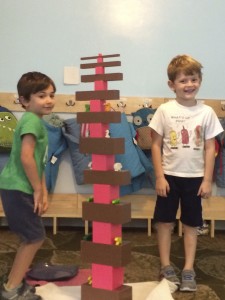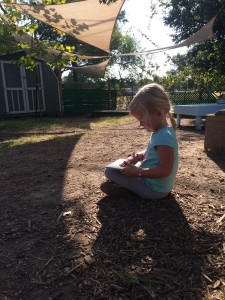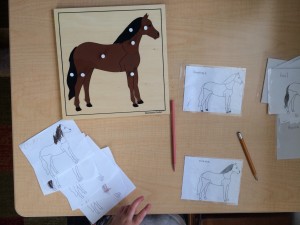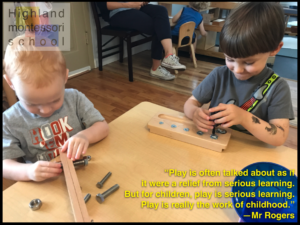The word most often used to describe children in a Montessori classroom is “Independence.” And thus, the impression that a lot of people have of Montessori is that it has “no rules.”  However, the idea that “independence” equals “no rules” is not a logical conclusion. Parents often choose a Montessori education for their children because the Montessori curriculum promotes independent thinking as the child develops.
However, the idea that “independence” equals “no rules” is not a logical conclusion. Parents often choose a Montessori education for their children because the Montessori curriculum promotes independent thinking as the child develops.
Children are similar in every school in that they play. In a Montessori 3-to-6 classroom that play is called “work” and it has a rhythm and structure to it. Maria Montessori created a beautiful environment for the children, and in this environment their activities take the form of cleaning the house, completing world map puzzles, manipulating 3-D geometric solids, pouring water from a pitcher, or arranging specifically designed rods, cubes and blocks (photo at right). Our Montessori classrooms actually structure “play” into an educational experience. The result is young people who crave knowledge, understanding and purpose through their own activities.
There are subtle rules in the classroom–our work cycle. A child first has to retrieve and roll out a workmat. Then the work is removed from the shelf and brought to the mat. When the task is completed, it should be returned to its place on the shelf, and the work mat rolled up and properly stowed. Developing this sense of order is very important to a young child, and it is a skill that can be carried on through their educational life and into adulthood.
 A core philosophy of Montessori is the four pillars of order, coordination, concentration and independence.
A core philosophy of Montessori is the four pillars of order, coordination, concentration and independence.
- Our brains seek order in the world, and to young children, this is an important aspect of development. This could be familiar routines, learning the steps of doing a work or cleaning up a spill–parts of the work cycle mentioned above. Finding order is a pleasurable experience for a young child.
- Once the orderly world makes sense, the child can develop coordination. In a Montessori pre-school, this may be using tongs, pouring water, carry the brown stairs, cutting paper, writing letters, etc. This practice may happen over and over again, leading to…
- Dr. Montessori observed how a child will repeat a task over and over again. Within this repetition, a child develops concentration, meaning that the child will direct focus on the task at hand. Being able to do so without external interruptions is a key to brain development.
- Concentration comes with peace of mind, leading the child to seek to repeat the task of her own free will. Being able to seek out the tasks that make one satisfied is the independence that a Montessori education seeks to create.
Consider these preschoolers when they are older. Whether your child is 3 years old or 13, children have the opportunity to explore ideas that they are interested in. At age 3, this may be following a bug around the yard or pouring beans from pitcher to cup and back again, and again and again. At 13, this manifests itself in reading 10 history books in a row, or running the same experiment over and over again to satiation. The “no rules” classroom is not at all a lack of discipline; rather, it’s the self-disciplined child who is on their way to being a life-long learner.
See related post on Movement in the Montessori Classroom.

See also this related blog post from North American Montessori Center: Playful learning in the Montessori Environment.
